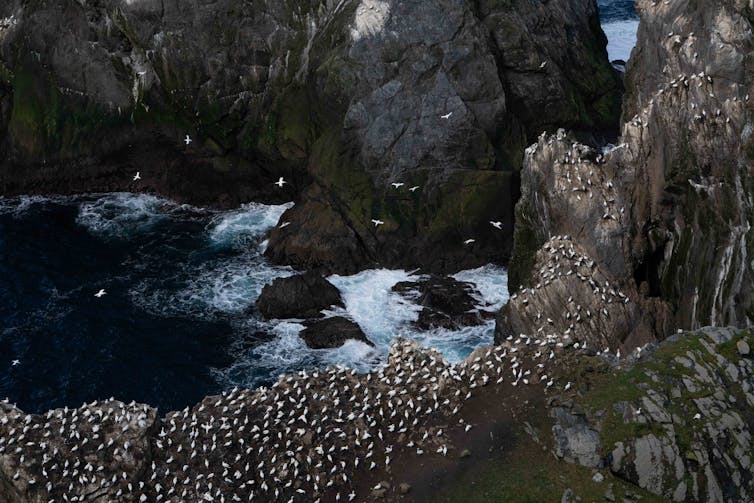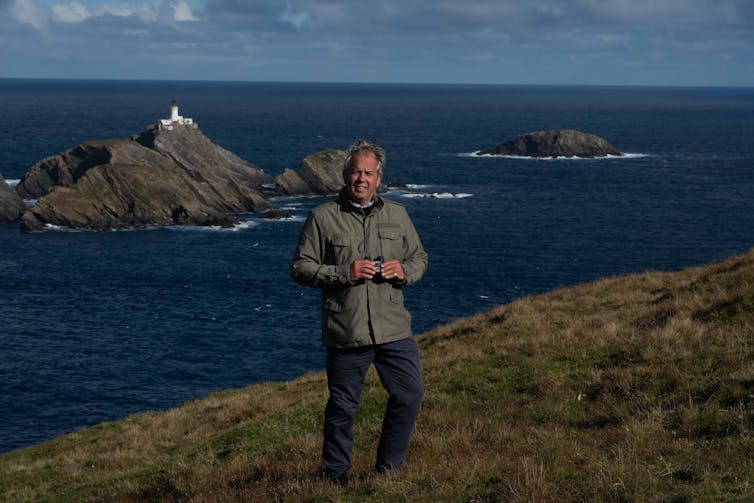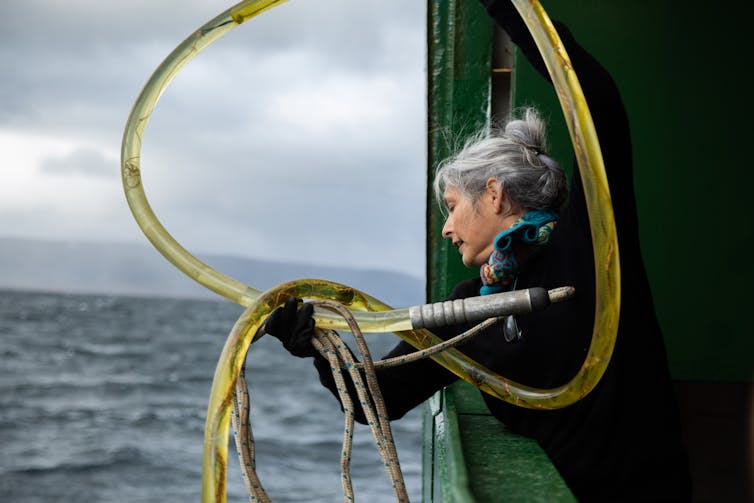(The Conversation) – Kirsten Freja Young, University of Exeter and Brendan Godley, University of Exeter
At the most northerly tip of the UK, looking north from the island of Muckle Flugga, Shetland, the cold wind whips up the sea and gannets dive.
While biodiversity loss in the Arctic Ocean may seem like a distant issue, the Shetland Islands lie further north than the Arctic Ocean’s southernmost waters.
The Arctic Circle is only 380 miles (610km) north of British waters – the same distance as London to Edinburgh by road.
Arctic wildlife is changing in ways that scientists like us don’t yet fully understand. Better protection for these species is urgently needed.
Establishing a new North Pole marine reserve where industrial activities such as shipping, oil and gas exploration and fishing are banned could provide an ocean sanctuary for wildlife.

Sophie Bolesworth/90 North Foundation, CC BY-NC-ND
Explorer-turned-conservationist Pen Hadow wants to create an internationally agreed marine reserve in the Central Arctic Ocean by 2037. He was the first person to trek solo from Canada to the geographic North Pole 21 years ago. The route he took in 2003 is no longer possible due to climate change.
In 2021, Hadow founded the 90 North Foundation, an environmental charity that is campaigning for a North Pole marine reserve to protect the Arctic’s peoples, its wildlife and its natural landscape.
Our team of marine researchers at the University of Exeter is collaborating with Hadow to explore how climate change will affect the ice and oceans in the Arctic and beyond.
Projected climate change poses great peril for wildlife such as polar bears and narwhals which are highly adapted to Arctic waters, relying on multi-year ice for foraging and breeding habitat.

Sophie Bolesworth / 90 North Foundation, CC BY-NC-ND
So far, we have completed two ten-day surveys for whales and dolphins using both visual sightings and acoustic or sound monitoring underwater. We have also collected water samples to test for “environmental DNA” or eDNA. By filtering water and collecting small fragments of biological material, we can identity the presence of species by sequencing the trail they leave behind in the water in the form of fish scales, poo, skin or mucus, for example.
Once we have built a picture of where wildlife lives and how it moves about, changes in the Arctic ecosystem can be more easily monitored.
Arctic animals are also regularly spotted in British waters.
Ringed seals have been seen as far south as Cornwall. Beluga whales have been spotted off the coast of Shetland, and Atlantic white-sided and white-beaked dolphins frequently move between UK waters and the low Arctic. Bearded seals have been spotted in UK coastal waters, as have walrus and harp seals.
Brent geese, barnacle geese and pink-footed geese plus eider ducks, red knot, ringed plover and bar-tailed godwits all migrate between the Arctic and the UK. These birds breed in the Arctic and sub-Arctic, then overwinter in the UK and Ireland. These birds are particularly vulnerable because climate change is leading to wetter springs that can reduce their breeding success.

Danielle Zalcman, CC BY-NC-ND
The wildlife living along UK’s shores is already changing as a result of climate change. Some species might expand their range northwards and this could further disrupt the Arctic ecosystem.
As well as monitoring wildlife, we are tracking the changing volume and routes of ships travelling through the Arctic Ocean. While our research is at an early stage, it’s already clear that industrial vessel activity in the Arctic Ocean is increasing as fishing vessels and cargo ships take advantage of the receding ice to make swifter routes across the globe.
The Arctic albedo
As the Arctic changes, the ramifications will be felt globally. The Earth’s northernmost white cap acts as a reflective shield against solar radiation. As the ice recedes, and the surface of the Earth darkens, so too does the planet’s in-built ability to reflect the sun’s warming rays.
Standing on a boat at the edge of the Arctic ice, we can see the powerful glow of sunlight reflecting from the icy surfaces. Any loss of this albedo (the ability of white ice to reflect sunlight and heat from the sun) triggers further warming, catalysing a negative feedback loop with profound implications. Rising temperatures can only be tackled by reducing greenhouse gas emissions.
Alongside this, we must protect the unique wildlife that have made the Arctic their home. A broad and encompassing approach to conservation of northern ecosystems could help limit the effects of human activities and the changing climate across the Arctic region and beyond. A well-connected global network of marine reserves that includes the Arctic Ocean is urgently needed.
![]()
Kirsten Freja Young, Senior Lecturer, Ecology, University of Exeter and Brendan Godley, Professor of Conservation Science, University of Exeter
This article is republished from The Conversation under a Creative Commons license. Read the original article.
Featured image: Kirsten Young has been monitoring wildlife in the Arctic Ocean. Danielle Zalcman, CC BY-NC-ND.



 © 2026 All Rights Reserved
© 2026 All Rights Reserved